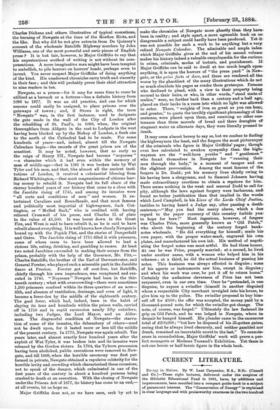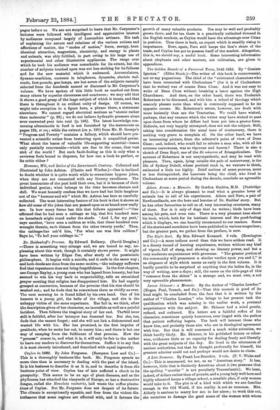CURRENT LITERATURE.
Enf rgy in Nature. By W. Lant Carpenter, B.A., B.Sc. (Cassell and Co.)—These eight lectures, delivered under the auspices of the Gilchrist Educational Fund in 1881, have, by additions and improvements, been moulded into a compact guide-book to a subject of paramount interest. The "Conservation of Energy" is explained in clear language and with praiseworthy exactness in the two hundred. pages before us. We are not surprised to learn that Mr. Carpenter's lectures were followed with intelligent and appreciative interest by audiences composed largely of Lancashire artisans. His task of explaining the nature and relations of the various actions and affections of matter, the "modes of motion," force, energy, heat, chemical attraction, magnetism, electricity, and energy in plants and animals, was ably fulfilled, in part owing to his large use of experimental and other illustrative appliances. The range over which he took his audience was remarkable for its extent, but the number of subjects touched upon was not less striking for its fullness and for the new material which it embraced. Accumulators, dynamo-machines, currents in telephones, dynamite, electric rail- roads, foot-pounds, gas-lamps, are but seven of the subjects casually selected from the hundreds named or discussed in Mr. Carpenter's volume. We have spoken of this little book as marked out from many others by superior cleverness and exactness ; we may add that it shows a good grasp of the large subject of which it treats, and that there is throughout it an evident unity of design. Of course, we might take exception to a figure here, a phrase there, a statement elsewhere. We cannot regard electrical motions as "atomic rather than molecular" (p. 28) ; we do not believe hydraulic pressure alone ever converted peat into coal (p. 186). The latest knowledge con- cerning allmminoids in food is not furnished by the statements on pages 192, et sea; while the extract (on p. 199) from Mr. H. George's -" Progress and Poverty" contains a fallacy, which should have pre- vented a scientific writer from bestowing upon it unqualified praise. What about the losses of valuable life-supporting material—losses only partially recoverable—which are due to the ocean, that vast sink of the world ? But such fault-finding as this is only what a reviewer feels bound to dispense, for how can a book be perfect, or its critic either ?



































 Previous page
Previous page